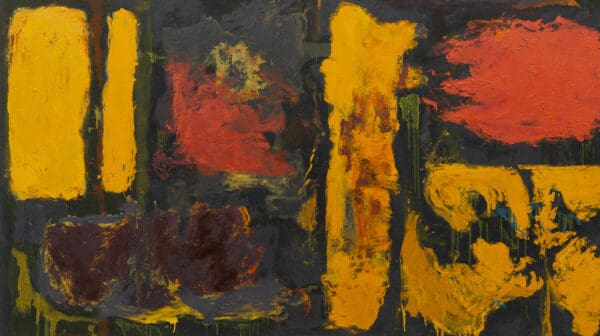
Making Space at the Table
NAP Contemporary’s group show, The Elephant Table, platforms six artists and voices—creating chaos, connection and conversation.
Tasmanian artist Robert O’Connor has won the 2020 Glover Prize with a unique take on landscape painting: an over-sized chunk of lamb sitting atop peas, gravy and mash, placed in an outback setting.
Titled Somewhere on the midlands, the winning work adhered to the Glover Prize’s callout to define contemporary Tasmanian landscape painting in its broadest sense.
Having been selected as a Glover Prize finalist four times since the award’s establishment in 2004, O’Connor’s winning painting is not only creatively ambitious, but speaks to cultural and ecological concerns. In particular the Hobart-based artist was interested in the links between European colonisation and farming, and the effects of these on Tasmania. “Things were going pretty good,” said the artist in an explanation of the work. “Then Europeans arrive, erect fences and place foreign livestock on the land, now we’re cooked. I can hardly see the landscape with all of this stuff in the way.”
As the prize judges Chris Saines, Jarrod Rawlins, and Fiona Lowry explained in a joint statement, O’Connor’s work blends humour and social responsibility. “We had heard Robert O’Connor described as a ‘Cartographer, archaeologist, explorer, scavenger, and sociologist’, and would agree that he is all those things, as well as a skilled painter,” said the judges. “O’Connor’s painting, Somewhere on the midlands, is at first a humorous and poetic look at our colonial past and the impact that had on the pre-European landscape, as well as a deliberate prod to issues such as deforestation and revegetation.”
While the over-sized slab of meat has clear absurdist resonances, for O’Connor the gesture is more exemplary of his practice at large. “Armed with the postmodern trends of appropriation, pastiche and ironic estrangement, the works question ideas of originality and authorship while remaining engaged with painting traditions,” said O’Connor in a statement. “Much as a magpie collects shinny things or a catfish eats shit, I collect images. Well, perhaps I don’t collect them as much as they are thrown at me, along with opinions, every day and mostly unsolicited.” From here it’s a case of organising borrowed imagery that sits between the sensical and non-sensical.
Alongside awarding O’Connor the top honour and a $50,000 prize, the Glover Prize judges also awarded two finalist pieces with Highly Commended Awards: Ileigh Hellier for Without the other, and Laura Patterson for 2020 Pteridomania.